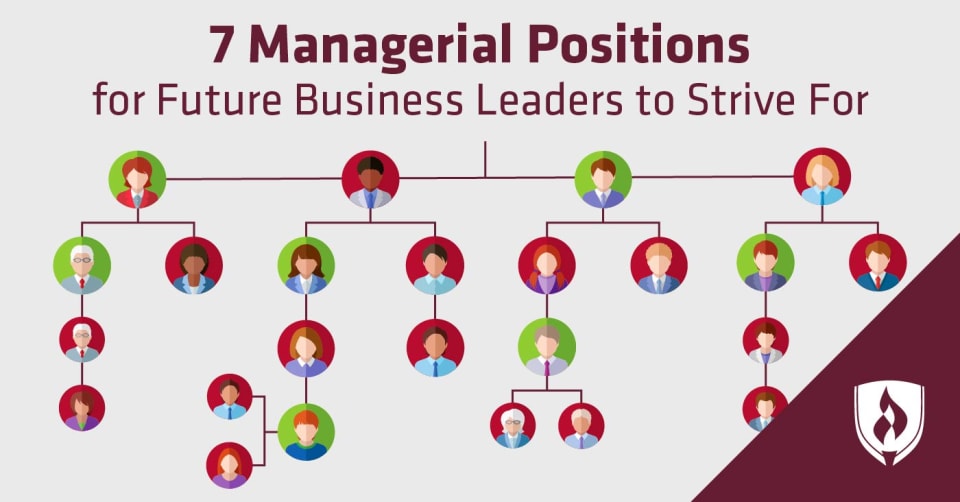
You’ve come a long way since borrowing a family friend’s old blazer for that first job interview. Since then, you’ve got yourself on a steadier career footing and things are going ok. But you can’t help but wonder if it’s time to take the next step. Some people shy away from climbing the ladder, but you know that you’re capable of more—you just need a little help in determining where to focus your effort.
To help you determine what career path to choose, we’ve taken a closer look at a variety of managerial positions you may be interested in pursuing as you advance in your career. Whether you’re in healthcare, IT, marketing or finance, there is a “next rung” on the career ladder—and it is closer than you think!
7 Management roles to strive for
Career growth can take you in a ton of directions—so what can you expect from these different branches of opportunities? We take a closer look at seven management positions to potentially grow into.
1. Health services manager
Job duties: Health services managers handle the business behind healthcare. Just like any other business, hospitals need to turn a profit in order to stay open. As a manager, you would keep track of services rendered, prices charged and bills paid. You may also work with medical staff to determine if your department is running efficiently. Do the doctors want more time with their patients? Are the nurses consistently working overtime on shifts? Will a change in our scheduling process cause issues? Are patients satisfied with the outcome of their visits? These are the kinds of questions and factors health services managers weigh.
Work environment: You can work in a variety of settings including outpatient clinics, hospital departments such as pediatrics, or—with additional licensure—nursing homes.
Job outlook: The Bureau of Labor Statistics (BLS) projects an 18 percent increase in employment of medical and health services managers by 2028, much faster than the national average of 5 percent for all occupations.1 Given the large aging population and improved management of chronic illness, more workers are needed across the board to manage the increased patient load.
Education requirements: Education requirements for these roles will vary somewhat depending on the specifics of the position. That said, our analysis of over 422,000 medical and health services management job postings from the past year found that 67 percent of positions were seeking a Bachelor’s degree at a minimum.2 Looking beyond minimum requirements, 36 percent of health services manager job postings preferred candidates with a Master’s degree.2
2. Human resources manager
Job duties: An HR manager plays a vital role in the handling of an organization’s internal business. In this position, you would oversee the efforts of a team to find, hire, and onboard new employees. Additionally, HR managers guide efforts to mediate workplace conflicts and ensure that all parties feel safe and fairly treated. Being detail-oriented is a must as you will keep track of sometimes complex employment laws regarding equal employment opportunity, healthcare, wages and retirement plans.
Work environment: Most HR managers work in traditional business settings; however, you may need to travel for recruitment purposes such as to job fairs or college campuses.
Job outlook: The BLS projects a 7 percent increase in employment of human resources managers human resources managers by 2028, faster than the national average.1
Education requirements: Our analysis of over 91,000 human resources manager job postings found that 82 percent were seeking candidates with a Bachelor’s degree at a minimum.3 When including preferred education requirements, 25 percent of human resources manager job postings were seeking candidates with a Master’s degree.3
3. Information systems manager
Job duties: Information systems managers do a lot more than just troubleshoot technical problems. As an information systems manager, you would oversee large scale IT initiatives and ensure systems are operating as planned. The exact duties of these roles will vary based on the size and structure of the company, but these professionals are often tasked with the creation and vetting of plans for changes in IT infrastructure and may manage the IT team responsible for the deployment and upkeep of that infrastructure.
Work environment: Like most of these positions, you can find information systems manager positions at virtually any large company. Given how critically important information technology infrastructure is for many organizations, this role may be subject to long hours during periods where complications arise.
Job outlook: The BLS reports an 11 percent increase in employment for computer and information systems managers by 2028, much faster than the national average.1
Education requirements: Our analysis of over 27,000 information systems management job postings found that 88 percent were seeking candidates with a Bachelor’s degree at a minimum.4 When including preferred education requirements, we found 42 percent were seeking candidates with a Master’s degree.4
4. Marketing manager
Job duties: Marketing managers help set the strategy for driving customer demand for products. Think who, why, when, where and how. Who is the customer? Why do they care? When is the right time to connect with them? On social media, a billboard, both? Do they want anecdotes or proof? These professionals analyze market research and pair it with an understanding of human psychology to optimally position their organization’s product or service. A knowledge of economics and finance is key to trend analyzing and market research, but connecting with your audience through empathy is what will set you apart.
Work environment: Marketing managers typically work either as part of an agency that represents multiple clients or in-house for one company.
Job outlook: The BLS projects an 8 percent increase in marketing manager jobs by 2028, faster than the national average.1 As the print industry declines, most of these positions will be in digital marketing.
Education requirements: Our analysis of over 274,000 marketing manager job postings found that 90 percent were seeking candidates with a Bachelor’s degree at a minimum.5 When including preferred education requirements, we found 37 percent preferred candidates with a Master’s degree.5
5. Sales manager
Job duties: The work of a salesperson is nothing new—they gather information about the potential needs of a prospect and work to convince them that their product or service is the best way to meet that need. So where do sales managers fit in this? On top of performing sales work of their own, they typically train and oversee the work of a team of sales professionals, set goals and budgets, determine discount rates and communicate with other business stakeholders. These professionals can either work in business to business sales (for example, selling raw materials to a manufacturer) or business to consumer sales (selling a finished product like a car directly to consumers).
Work environment: This is typically an office job; however, you may have to travel nationally, even internationally, for important sales depending on the kind of company you work for.
Job outlook: The BLS projects a 5 percent increase in sales manager employment by 2028, the rate of the national average.1
Education requirements: Our analysis of over 368,000 sales manager job postings found that 80 percent were seeking candidates with a Bachelor’s degree.6 When accounting for preferred educational background, that figure jumps to 90 percent seeking a candidate with a Bachelor’s degree and 19 percent seeking a candidate with a Master’s degree.6
6. Financial manager
Job duties: Financial managers are the professionals who oversee the teams responsible for providing a clear picture of an organization’s financial health. They create financial reports, audit financial information, guide investment activities and help organizations set and plan long-term financial goals. This role can have a huge influence on the overall direction of an organization as management teams often rely heavily on their input when weighing potential courses of action.
Work environment: The finance and insurance industries are a very common landing spot for financial managers, however financial management roles can be found in nearly any business.
Job outlook: The BLS reports a 16 percent increase in financial manager jobs by 2028, much faster than the national average.1
Education requirements: Our analysis of over 265,000 financial manager job postings found that 84 percent were seeking candidates with a Bachelor’s degree at a minimum.7 When accounting for preferred educational background, we found that 35 percent of job postings preferred candidates with a Master’s degree.7
7. General manager
Job duties: General and operations management roles can cover a little bit of everything—recruiting employees, managing budgets, analyzing sales, and overseeing production or overall operations are all fair game. The day to day duties of this role will vary heavily based on what you’re overseeing—a retail store has different challenges and responsibilities than what you’d see in a factory. No matter the setting your goal as a general manager is to ensure things are running smoothly and efficiently.
Work environment: As we mentioned before, this can vary substantially depending on what you’re overseeing. This could mean a regional cluster of coffee shops or a massive international production facility.
Job outlook: The BLS projects a 7-10 percent increase in general and operations manager jobs by 2028, faster than the national average.1
Education requirements: Our analysis of over 342,000 general and operations manager job postings found that 65 percent were seeking candidates with a Bachelor’s degree at a minimum.8 When accounting for preferred educational background, that figure jumps to 77 percent seeking a candidate with a Bachelor’s degree and 22 percent seeking a candidate with a Master’s degree.8
Ready to take the next step?
Transitioning to a managerial position is not just good for your bank account. If you are interested in developing your leadership skills and genuinely improving business, being a manager can help you see the office from a different perspective. It might seem intimidating at first, but then again, so did that first job interview.
Don’t let a lack of formal education be what holds you back from advancement. Rasmussen University offers a variety of high quality, flexible programs that can help you get to the next step in your career. To explore your options, visit the Rasmussen University School of Business page.
Related Articles:
- 5 Managerial Qualities You Didn't Know You Already Have
- 8 Business Management Skills You'll Need in Order to Lead
- 5 Tried-and-True Business Analysis Techniques the Pros Swear By
1Bureau of Labor Statistics, U.S. Department of Labor, Occupational Outlook Handbook, [information accessed March 5, 2020] www.bls.gov/ooh/. Employment conditions in your area may vary.
2Burning-Glass.com (analysis of 422,212 medical and health services manager job postings, March 1, 2019 - February 29, 2020)
3Burning-Glass.com (analysis of 91,623 human resources manager job postings, March 1, 2019 – February 29, 2020)
4Burning-Glass.com (analysis of 27,404 information systems manager job postings, March 1, 2019 – February 29, 2020)
5Burning-Glass.com (analysis of 274,360 marketing manager job postings, March 1, 2019 – February 29, 2020)
6Burning-Glass.com (analysis of 368,096 sales manager job postings, March 1, 2019 – February 29, 2020)
7Burning-Glass.com (analysis of 265,128 financial manager job postings, March 1, 2019 – February 29, 2020)




